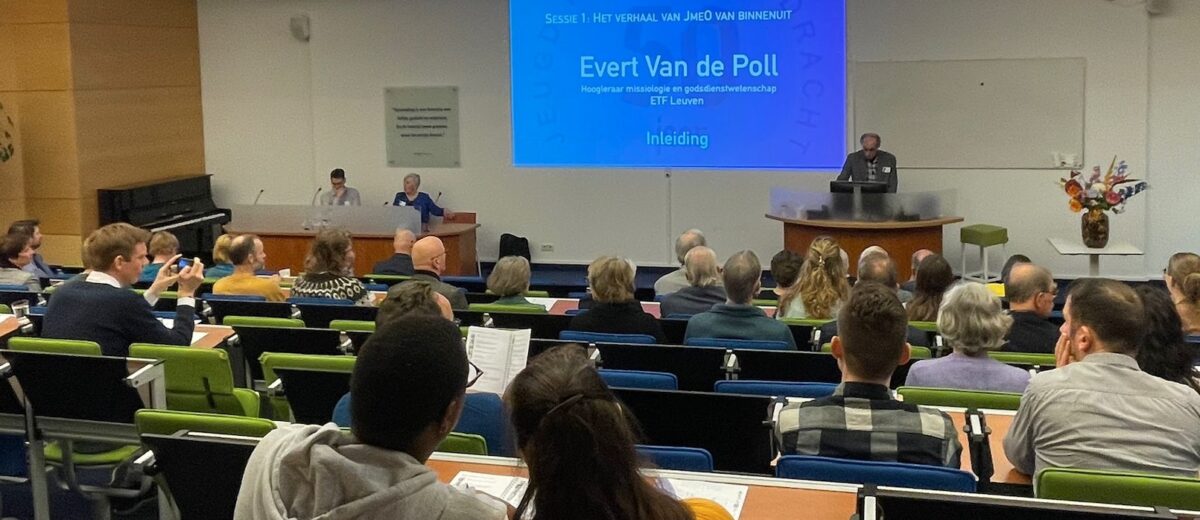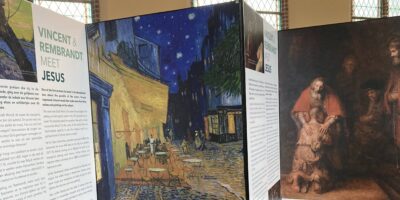‘YWAMers are known for thinking out of the box.’
YWAMers are ‘innovative’, ‘imaginative’, ‘creative’ and ‘visionary’. These were descriptions offered by attendees at a symposium held on Friday, evaluating 50 years of Youth With A Mission’s influence on church and mission in the Netherlands.
The hundred participants – staff, alumni and friends of YWAM, representatives of other organisations, and academics from various institutions – were invited to express words they felt best described YWAM. Using an app for interactive engagement, they offered the following adjectives:
Radical, global, reaching out, on fire, passion, wild, for everyone, informal, missions, waves of young people, next generation, together, generous, initiating, serving, holistic, transformational….
Although focusing on the movement’s legacy, the symposium was not a ‘YWAM event’ per se. It was hosted at the Christian University for Applied Science (CHE) in Ede, under the auspices of MissieNederland, the Dutch Evangelical Alliance. Of the 22 contributors, only five were current YWAM staff, telling the YWAM Netherlands story at the start and bringing closing comments at the end of the day.
When my Schuman Centre colleague Evert Van de Poll first suggested the symposium, I immediately saw two very good reasons. Firstly for YWAM’s sake. It would help the current YWAM leaders, few of whom were even born by 1973 when Romkje first registered Jeugd Met Een Opdracht, to understand more in depth the mission they had inherited. And it would be a healthy ‘external audit’, offering accountability to the broader Body of Christ in the Netherlands.
Secondly, for academia’s sake. It would encourage some of Evert’s academic colleagues to take a serious look at the Dutch branch of one of the largest missions in the world, which thus far has remained under the radar of theologians and missiologists. That, Evert indicated in his closing comments, was a scandalous omission needing correction.
Leading role
In the morning sessions, observations and experiences were shared from those who have known the mission over many decades from inside or outside. Arnold van Heusden, former director of the Dutch Evangelical Alliance, spoke of YWAM’s leading role in Holland in promoting discipleship training, worship, prayer, church planting, ministry among Muslims, prostitutes and refugees, pastors conferences, the mobilisation of youth for world missions and a host of daughter missions.
Joop Strietman, former leader of Operation Mobilisation NL, compared similarities and differences of the two youth mission movements, highlighting the respect and friendship between George Verwer and Loren Cunningham. He unearthed a rare photo of a young Loren participating in OM’s second summer outreach in Europe in 1963.
Ina Ruiter, who with her husband Harm led the Catholic youth movement in the Netherlands, told of how YWAM Kerygma Teams, a Catholic focused ministry particularly active in Austria, Ireland and Belgium, had led the way in giving Dutch Catholics hands and feet to the discipleship training and evangelism that popes and theologians had talked about since Vatican II. Could YWAM the Netherlands, she proposed, not also be more engaged in Catholic Holland?
The academic reflections presented after lunch by evangelical theology professors with missiological and anthropological specialties both affirmed strengths and signalled concerns. While YWAMers may well be ‘out-of-the-box’ thinkers, would it not be healthy if they were encouraged to think occasionally outside the YWAM-box?
Accountability
Loren’s insistence that every Christian can hear God’s voice, that everyone can be engaged in missions, and that women are equal partners with men in God Kingdom, was acknowledged by several speakers. Yet concern was raised that some YWAM resources, including Loren’s ‘seven spheres’ teaching, have been used to justify a power-based Dominion Theology, sometimes expressed as the Seven-Mountains teaching popular among American evangelicals to promote a Christian nationalism seeking ‘take back our nation for God’. One YWAM publication warning against ‘touching the Lord’s anointed’ was quoted as opening possibilities for leadership abuse.
Was there sufficient interaction between YWAM’s policymakers on the one hand and leading missiologists and mission practitioners on the other? Or accountability of YWAM leaders in a nation to leaders in the Body of Christ? While much money, time and effort was invested in networking within YWAM international leadership, what efforts were made to receive advice within the nation? How can YWAM leaders protect themselves from ‘echo-chamber’ thinking among the like-minded?
Each of the researchers expressed difficulty finding research on YWAM during preparation. After emailing YWAM Europe leaders last week about such research, I was informed of ‘dozens of masters-level dissertations done in our various (University of the Nations) master’s programmes in recent years’. Why then were they so difficult to find for our researchers? Are they posted on academic research platforms? Are their findings being made easily available to help guide YWAM leaders and staff? Has anyone compiled a bibliography of research by YWAMers, or about YWAM by non-YWAMers? Has anyone analysed topics researched? Would they be heavily weighted towards leadership and spiritual formation, as I suspect? Which ones engage with the public square and the spheres we have talked about for almost 50 years now?
We YWAMers left the symposium both affirmed and challenged, with much reflection and homework to do.
P.S. All sessions and papers were in Dutch and most are available on missienederland.nl/symposium/downloads
Till next week,




These are some excellent and needed questions that were raised. As a networker, I have been to many conferences outside YWAM and rarely met other YWAMers there. It is so true, many YWAMers think only inside the YWAM box and don’t network with other ministries around them. These questions really need to be heard by a wider audience of YWAM leaders.